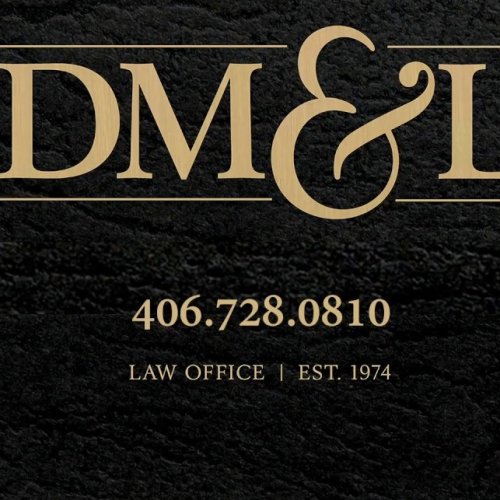Best Child Visitation Lawyers in Montana
Share your needs with us, get contacted by law firms.
Free. Takes 2 min.
Free Guide to Hiring a Family Lawyer
Or refine your search by selecting a city:
List of the best lawyers in Montana, United States
About Child Visitation Law in Montana, United States
Child visitation, also known as parenting time, refers to the legal right of a non-custodial parent or other significant individual to spend time with a child after separation or divorce. In Montana, child visitation law is designed to support the best interests of the child by allowing meaningful ongoing relationships between the child and both parents, whenever possible. The courts encourage cooperation between parents to develop visitation schedules that best consider the child’s emotional and developmental needs.
Why You May Need a Lawyer
Legal issues around child visitation can be complex and emotionally charged. You may need a lawyer if you are facing any of these situations:
- You are unable to reach an agreement with the other parent regarding visitation schedules.
- The other parent is denying you access to your child or violating existing court orders.
- You believe the proposed visitation arrangement is not in the best interests of your child.
- There are allegations of abuse, neglect, or substance abuse affecting your child’s well-being.
- You wish to modify an existing visitation order due to changes in circumstances.
- You are a grandparent or other third party seeking visitation rights.
A lawyer can help you understand your rights, negotiate with the other parent, represent you in court, and ensure that the final agreement or order is fair and legally enforceable.
Local Laws Overview
Several Montana statutes and local court procedures govern child visitation. Key aspects to be aware of include:
- Best Interests of the Child: Montana courts base visitation decisions on what is best for the child, considering factors such as each parent’s relationship with the child, the child’s adjustment to home and community, and the stability of the proposed arrangements.
- Parenting Plans: Parents are typically required to submit a parenting plan detailing visitation schedules, decision-making responsibilities, and dispute resolution methods. If parents cannot agree, the court will establish a plan.
- Third-Party Visitation: In certain cases, non-parents such as grandparents may petition for visitation if they can show a substantial relationship with the child and that visitation is in the child’s best interest.
- Modification and Enforcement: Visitation orders can be modified if there has been a significant change in circumstances. If a parent violates visitation terms, legal remedies are available.
- Domestic Violence: The court may restrict or supervise visitation if there are safety concerns due to domestic violence or other serious issues.
Frequently Asked Questions
What is the difference between custody and visitation in Montana?
Custody generally refers to who has legal decision-making authority for the child, while visitation (parenting time) refers to the schedule under which the non-custodial parent spends time with the child.
How do Montana courts decide visitation arrangements?
Courts consider the best interests of the child, including the child’s relationship with each parent, each parent’s ability to provide a safe and nurturing environment, the child’s adjustment to their home, school, and community, and any other factor affecting the child’s welfare.
Do grandparents have visitation rights in Montana?
Montana law allows grandparents and other third parties to request visitation, but it must be shown that visitation serves the child’s best interests, usually by proving a significant established relationship exists.
Can visitation be denied to a parent?
Visitation can be restricted or denied if the court finds that visitation would seriously endanger the child’s physical, mental, or emotional health, such as in cases of abuse or substance abuse.
How can I enforce a visitation order in Montana?
If the other parent violates a visitation order, you can file a motion for enforcement with the court. The court may remedy violations through enforcement actions, makeup visitation, or even changes in custody in extreme cases.
What if my work schedule changes and I need to modify the visitation agreement?
You can petition the court for a modification if you experience a substantial change in circumstances, such as a change in employment or residency that affects the current schedule.
Is supervised visitation available in Montana?
Courts may order supervised visitation if there are concerns about the child’s safety or well-being. Supervision can be provided by a third party or a professional agency.
Do children get a say in Montana visitation decisions?
The wishes of the child may be considered by the court, especially as the child becomes older and more mature, but their preference is only one factor among many.
Can a parent move out of state with the child?
A parent generally must obtain court approval to relocate with the child if the move would significantly affect the other parent’s visitation rights. The court will again consider the best interests of the child.
How long does the visitation process take?
The timeline can vary depending on the complexity of the case and court availability. Agreements reached amicably may be approved in weeks, whereas contested cases involving hearings can take several months.
Additional Resources
Several resources can help you understand and address visitation issues in Montana:
- Montana Judicial Branch: Provides court forms and information on parenting plans and visitation.
- Montana Legal Services Association: Offers free or low-cost legal help and informational resources about family law.
- Office of the Child and Family Ombudsman: Helps resolve disputes involving child safety and welfare.
- Local Family Courts: You can contact your county courthouse for guidance on local procedures and filing requirements.
- Mediation Services: Many communities offer mediation to help parents agree on visitation without litigation.
Next Steps
If you need assistance with child visitation in Montana, start by gathering all relevant documents, such as current parenting plans, communication records, and any court orders. Try to communicate openly and respectfully with the other parent to resolve issues informally when possible.
If you cannot reach an agreement, consider contacting a family law attorney with experience in Montana child visitation cases. Many local organizations offer free or low-cost consultations. Prepare questions and be ready to discuss the specifics of your situation.
When taking legal action is necessary, follow the procedures outlined by your local court. Submitting the required forms and providing clear evidence will help your case. Remember that your primary focus should always be on the best interests of your child.
Finally, continue educating yourself using reputable resources. Understanding your rights and responsibilities is crucial for maintaining a healthy and positive relationship with your child.
Lawzana helps you find the best lawyers and law firms in Montana through a curated and pre-screened list of qualified legal professionals. Our platform offers rankings and detailed profiles of attorneys and law firms, allowing you to compare based on practice areas, including Child Visitation, experience, and client feedback.
Each profile includes a description of the firm's areas of practice, client reviews, team members and partners, year of establishment, spoken languages, office locations, contact information, social media presence, and any published articles or resources. Most firms on our platform speak English and are experienced in both local and international legal matters.
Get a quote from top-rated law firms in Montana, United States — quickly, securely, and without unnecessary hassle.
Disclaimer:
The information provided on this page is for general informational purposes only and does not constitute legal advice. While we strive to ensure the accuracy and relevance of the content, legal information may change over time, and interpretations of the law can vary. You should always consult with a qualified legal professional for advice specific to your situation.
We disclaim all liability for actions taken or not taken based on the content of this page. If you believe any information is incorrect or outdated, please contact us, and we will review and update it where appropriate.
Browse child visitation law firms by city in Montana
Refine your search by selecting a city.










